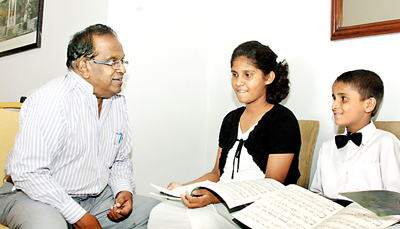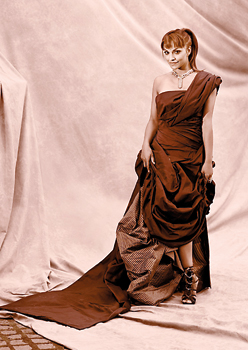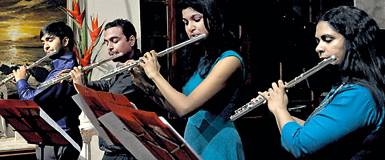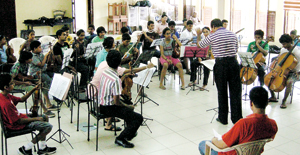Impressive impresario
Master of ceremonies, master of the manor, host to the manor born – Mano Chanmugam is steering his guests towards the cocktails and canapés. The occasion is a house concert and reception at the host’s palatial residence, just outside city limits. The crowd is a mix of musicians, music lovers and others, including a past prime minister and a past prime minister’s daughter.
The host has just rounded off an evening of serious classical music on a rousing personal note; after the main programme, featuring assorted artists, he and Neomal de Alwis, his friend and partner in business and music, sat at two grand pianos and tapped out, encore style, a string of light classical favourites and popular hits from the ’40s and ’50s. The mood is festive and domestic, the genial hosts’ warmth putting all at ease and melting away formalities.

Mano chats with music students. Photo: Indika Handuwela
In the course of the evening, Mr. Chanmugam made two announcements: one was the setting up of the Mano Chanmugam Music Foundation, to promote Western classical music in Sri Lanka and to sponsor underprivileged students seeking an education in classical music; the other was the Asia-Sri Lanka debut in November of internationally acclaimed soprano Danielle de Neise, who will give two concerts to mark her first visit to her ancestors’ homeland.
By playing impresario to diva de Neise, Mr. Chanmugam is paying tribute to the de Niese family, including the singer’s grandparents, the late Douglas and Estelle de Neise, both singers, who worked with him on choral concerts in the late ’40s and early ’50s. The de Neise family moved to Australia in the ’60s.
Glasses clink, voices buzz. Mano and Neomal are caught in the party crush. As we cannot wait long, we slip away ungraciously, without thanking the hosts.
Months later (just a couple of days back), we again meet Mano and Neomal, this time in their role as local representatives for the Associated Board of the Royal Schools of Music. Here at the Hilton Residencies in Colombo they are officiating at music exams, greeting and seating nervous young musicians and anxious parents. We are here not to take a music exam (that we did decades ago), but to hear Mano’s story, bits and pieces of which we have heard over the years. We are here to fill the gaps.
We learn that Mano is a qualified nuclear engineer; a businessman; that he was a math wiz at school; that he almost became a medical doctor, like his father Dr. Nason Chanmugam; that he spent six-and-a-half years studying for the priesthood, and then decided he did not have the vocation; that he spent the next few years in England studying at the Enfield College of Technology and wondering what to make of his life, and that it would be years before he finally returned to Sri Lanka,where he has made good. Also, that as an amateur musician he spends whatever time he can spare to promote the music loves.
Music is a constant in Mano’ s busy life, a sustained chord sounding in the background of his work and social life.
For the record, he is a Fellow of the Nuclear Institute of Great Britain – he came close to clinching a deal with the Atomic Energy Agency (AEA) that would have given the country its first nuclear research reactor, back in the 1960s, but political meddling scuppered the project. He is also a qualified entrepreneurial engineer; he set up Sri Lanka’s first high grade industrial readymix concreting facility, Informex Construction Ltd, which worked on the Bank of Ceylon building in the Fort, the World Trade Centre Twin Tower Project, and the Central Bank extension.
It’s hard to keep track of Mano’s zigzagging career, with its sharp twists and turns and false starts. There is a book waiting to be written about his life, but for now we are interested in the music chapter.
“There has always been music in my life,” Mr. Chanmugam says, gazing out upon a panoramic 13th floor view of Colombo, a vista that includes the abandoned sites of a past Mano Chanmugam business venture and an unfulfilled Mano Chanmugam music dream. One site, on the edge of the Beira Lake, near St. Joseph’s College, was earmarked for a state-of-the-art performing arts centre, a venture that would have become a reality but for a political change in the ’90s. “That fell through. The plan had most of the features of the new Nelum Pokuna Performing Arts Centre, and a few more,” he says.

“I started music lessons when I was five, under the guidance of my gracious mother. She heard me picking out La Cucaracha on the keyboard with one finger and said it was time to get serious. I had two great teachers, Mrs. Wambeek of Kotahena and the legendary Ethel Mack, who never once demonstrated how a piece should be played, but drew out the music from her students through inspired teaching.”
At St. Peter’s College, Bambalapitiya, Mano found like-minded souls. Among his schoolmates were gifted young men who would go on to become professional musicians, or professionals who were accomplished amateur musicians. These included Dr. Earle de Fonseka, Father Noel Crusz, Hussein Mohamed, Ray Forbes, Harold Seneviratne, Patrick Nelson, Dr. Tony Don Michael and Dr. Nihal Abeysundera.
“These were all lovely people. I was secretary of the school Music, Drama and Arts society. We turned the words around to read Music, Arts and Drama, or M.A.D. for short. We were mad about music, mad about the stage, mad in general.
“When it was time to think about my future, my father and brother, both doctors, said I should do medicine. This was after winning the school’s General Prize for Open Maths and Art. But the thought of dissecting rats and frogs and cockroaches put me off. Those of us who had an idea of becoming doctors were taken to see a post-mortem. The moment the pathologist plunged a bone saw into the dead body and started hacking through the ribcage, I blacked out. I was most certainly not cut out to be a surgeon. My good friend Noel Crusz said, ‘Well, if you can’t save bodies, why don’t you try saving souls?’
“It was after that that I started to think seriously about becoming a Roman Catholic priest. It was my mother who put the idea to me. My father, a Methodist, was dead against it. Anyway, I entered the National Seminary and did three years of philosophy and two-and-a-half years of theology. I attended the seminaries in Kalutara and Ampitiya. In my last year, I asked for time to think about my calling, and my mentor said that was a sign that I was not meant for the priesthood.”
Those six-and-a-half years in the seminary constituted the only time in his life that Mano was cut off from Western classical music, apart from the hymns sung in church. But there were exciting private discussions about music. An elderly French oblate had been a student of the French Impressionist Claude Debussy. “Every lesson with the composer was a lesson in newness, the priest told me. This was a thrill to hear. As a teenager I loved Debussy.”
Leaving the seminary in Ceylon, Mano proceeded to England to join his father, who had settled there in 1936. Mano studied for three years at the Enfield College of Technology, and in 1960 his career went “nuke”: he would spend the next 17 years in the nuclear power industry.
“I came back to Sri Lanka in 1977. I started a pioneer concreting business and it did well. In 1980 I bought a single-storey house and three acres of land overlooking the Bolgoda Lake, in Moratuwa. I added another three acres and built extensions. It was a dream home.
“I had three grand pianos. One was a nine-foot concert grand, a Schiedmayer that had belonged to Lord Louis Mountbatten. I also had an eight-foot Bluthner that had belonged to a niece of the English writer John Galsworthy. I bought this piano when I was working in England.”
Three years later, on the afternoon of July 23, the first day of the anti-Tamil riots of 1983, the dream home went up in flames, with all three pianos and everything else in the house destroyed. Only half an hour earlier, Mano’s office in Coniston Place, next to Wycherley, was burnt down.
Numbed by the experience, Mano told himself that looking ahead, and not looking back, was the way to go. He built himself a new home in a new location and set about rebuilding his life.
The music continues. He travels frequently and attends concerts. He and Neomal entertain friends with two-piano, four hands recitals. Mano has three grand pianos in his new home. These may not be as distinguished as the three previous grands, but they serve the purpose. One is a nine-foot Estonia, one an eight-foot Yamaha, and one a seven-foot Kawai. “These three grands have no grand historical significance,” Mano jokes.
The muffled piano music in the background has stopped. The day’s exams are over. Mano and Neomal are checking their watches. “You must excuse us. We have to run. Lots of work to do in anticipation of Danielle de Neise’s arrival.”
One last question: How did Mano clinch the Danielle de Neise engagement? Divas are booked years ahead, and de Neise’s orbit is strictly New York, San Francisco, Sydney, London and Glyndebourne.
“I called Glyndebourne and left a message. The singer was on tour. I mentioned that Danielle’s great-grandfather, George de Niese, was my choir master at St. Peter’s College, Bambalapitiya. She wrote back on her return and said she’d be honoured to sing in Sri Lanka.”
Follow @timesonlinelk
comments powered by Disqus




























